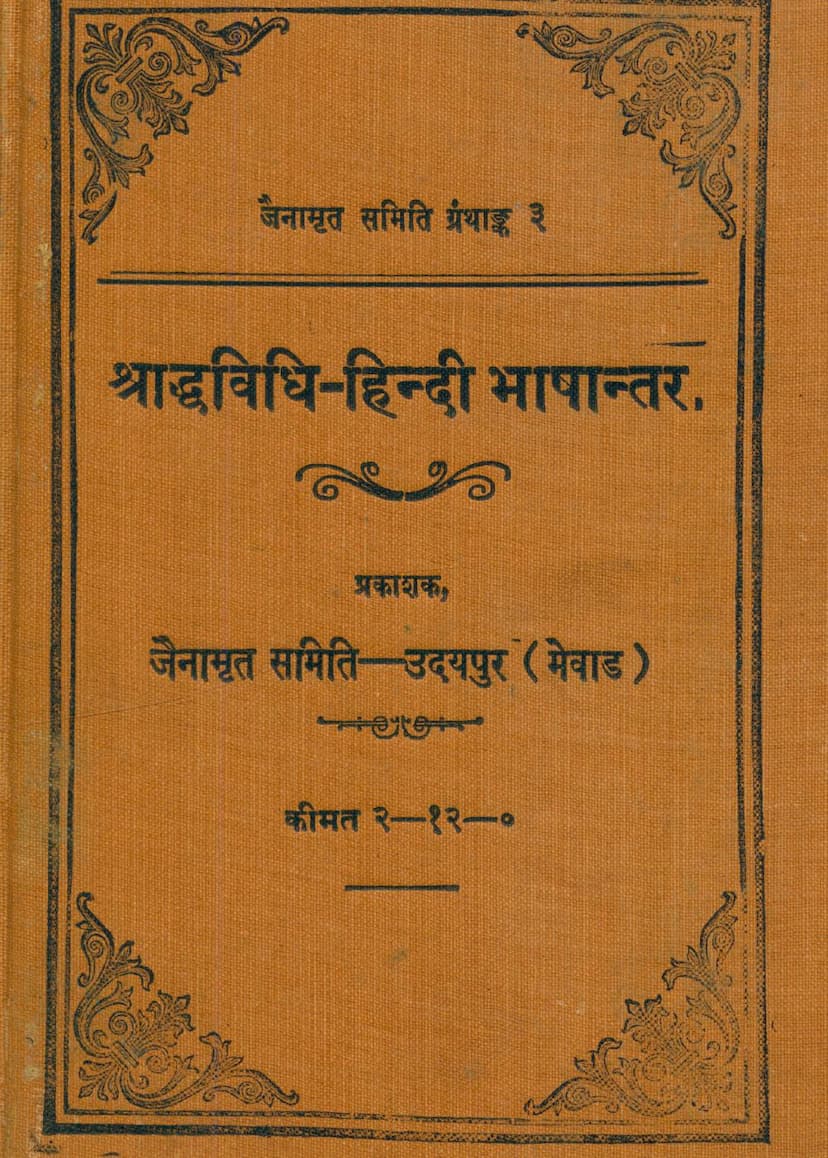Shraddh Vidhi
Added to library: September 2, 2025

Summary
The book "Shraddh Vidhi" (also known as "Shraddhvidhi Mul aur Vidhi Kaumudi Namak Teeka Ka Bhashantar") was authored by Ratnashekharsuri and published by Jain Bandhu Printing Press. This Hindi translation of the original work by Acharya Ratnashekharsuri, along with the commentary "Vidhi Kaumudi," is presented by the Jainamrit Samiti, Udaipur.
The book is a comprehensive guide to the duties and practices of a Jain householder (Shravak). It is divided into several 'Prakash' (chapters or sections), each focusing on different aspects of daily life and religious observance.
Here's a summary of the key themes and content covered in the book, based on the provided index and introductory sections:
Core Principles and Conduct of a Jain Householder:
- Qualities of a Worthy Follower: The text outlines the characteristics of an individual suitable for embracing the Shravak dharma, emphasizing qualities like good nature, sharp intellect, adherence to justice, and steadfastness in vows.
- Traits to Avoid: It highlights that individuals with attachment to worldly views, hatred towards dharma, foolishness, or those whose minds are firmly set in wrong beliefs are not suited for the true practice of dharma.
- Twenty-one Virtues of a Shravak: A detailed list of twenty-one virtues is presented, encompassing aspects like generosity, good appearance, pleasant nature, popularity, freedom from deceit, fear of sin, truthfulness, compassion, impartiality, and devotion to good qualities.
- Four Types of Shravaks: The text classifies Shravaks into four categories based on their understanding and practice: Namashravak (by name only), Sthapanashravak (symbolic representation), DravyaShravak (outward adherence without inner conviction), and Bhavashravak (true inner conviction and practice).
Daily Rituals and Observances (Din Kritya):
- Morning Routine: The book details the proper timing for waking up, the importance of getting up before sunrise, and the initial actions to be taken, including contemplation and remembering the principles of the Jain faith.
- The Navkar Mantra: A significant portion is dedicated to the practice and benefits of reciting the Navkar mantra, including methods of counting, visualization, and the auspiciousness of this mantra.
- Elements and Nadis: It explains the nature of the five elements (earth, water, fire, air, ether) and the importance of understanding 'Surya' and 'Chandra Nadi' (solar and lunar energy channels) for daily practices and their effects.
- Spiritual Practices: The text describes practices like 'Dharm Jagarika' (spiritual awakening), rituals for warding off nightmares, and the proper method of taking vows ('Niyam Lena').
- Purity of Objects: Detailed explanations are given on distinguishing between animate (sacitta), inanimate (acitta), and mixed (misra) substances, especially concerning food items and water, including their permissible times for use.
- Dietary Regulations: The text elaborates on the rules for consumption of various foods, including cereals, cooked items, and prohibited foods ('Abhakshya').
- Hygiene and Purity: It covers the proper methods for brushing teeth ('Datan'), bathing ('Snan'), and maintaining purity in worship.
- Worship Practices: The book describes the rituals for worshipping the Jinas (Tirthankaras), including the types of flowers to be used, the significance of bathing the idols, the concept of 'NirMalya' (used items in worship), and various forms of worship like 'Nava Ang Puja' and 'Ang Puja'.
- Devotional Songs and Music: It mentions the types of musical instruments and dramatic performances ('Natak') that are appropriate during worship.
Specific Practices and Their Significance:
- Vows and Observances ('Pachkhan'): The text provides detailed guidance on taking various vows, including 'Tivihar', 'Chovihar', 'Navkarasi', and the importance of adhering to them.
- Daily and Periodic Rituals: It covers the daily routine ('Din Kritya'), nightly rituals ('Ratri Kritya'), special observances during festivals ('Parva Kritya'), seasonal vows ('Chaturmasik Kritya'), annual observances ('Varshik Kritya'), and rituals related to birth ('Janma Kritya').
- Austerities and Fasting: Various forms of fasting and austerities are explained, highlighting their benefits and the correct way to observe them.
Ethical and Moral Guidelines:
- Righteous Living: The book emphasizes the importance of ethical conduct in all aspects of life, including business dealings, social interactions, and family relationships.
- Purity of Intent and Action: It stresses the need for purity in both thought ('Bhav Shuddhi') and action ('Dravya Shuddhi') during religious practices and daily life.
- Respect for Elders and Gurus: The text highlights the significance of respecting elders, spiritual teachers ('Gurus'), and following their teachings.
- Charity and Generosity: It encourages acts of charity and generosity, especially towards the needy and religious mendicants.
- Avoiding Sins and Transgressions: The book lists various sins ('Ashatana') and transgressions, particularly concerning the treatment of deities, scriptures, and spiritual guides, and provides methods to avoid them.
Illustrative Stories and Examples:
The text is rich with narratives and parables from Jain tradition and history. These stories serve to illustrate the principles and practices being discussed, making them relatable and memorable for the reader. Examples include:
- Bhuvanbhanu Kevali and Vrahmihir: Illustrating why those with attachment or aversion to dharma cannot attain true understanding.
- Farmer's Son: Demonstrating how a foolish person cannot grasp the essence of a guru's teachings.
- Shukraj: Highlighting the importance of humility and the consequences of arrogance.
- Surasundar Kumar's Wives: Illustrating the significance of true devotional practices.
- Ambad Parivrajak's Disciples: Showing the impact of renouncing worldly attachments.
- Kumar Pal Raja and Chahad Mantri: Illustrating the principle of not using another's worn clothes for worship.
- Jinah Shreshthi: A story about the importance of compassion in worship.
- Dharmadatta Raja: An example of performing worship with devotion and adherence to rules.
Overall, "Shraddh Vidhi" by Ratnashekharsuri is a foundational text for Jain lay followers, providing a detailed and practical roadmap for living a righteous and spiritually fulfilling life according to Jain principles. It aims to guide individuals in fulfilling their responsibilities towards themselves, their families, society, and the divine, thereby paving the path towards spiritual progress and liberation.